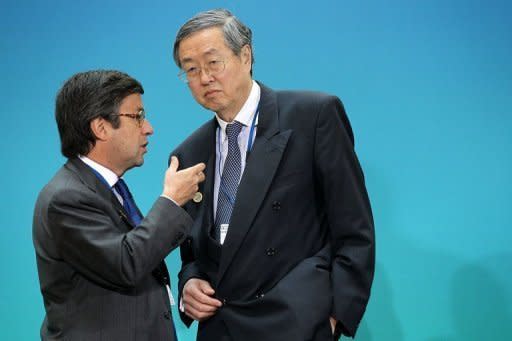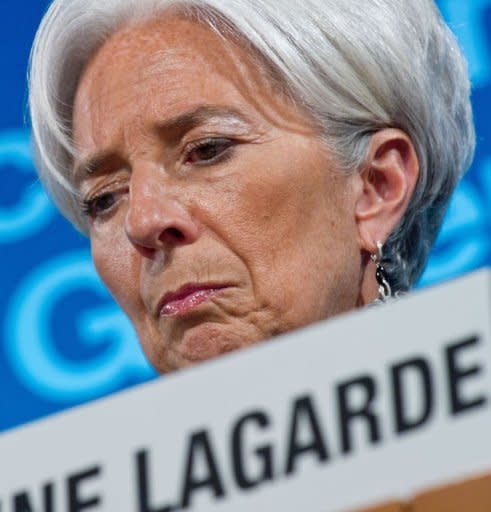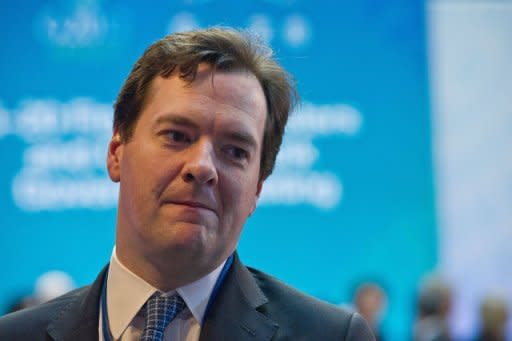IMF raises $430 billion for crisis firewall
The IMF raised $430 billion in new funds for crisis intervention Friday, with China and other emerging economic giants taking part despite worries the money will be used for more eurozone bailouts. After weeks of seeking pledges for its "global firewall", the International Monetary Fund said the BRICS group -- China, Russia, India and Brazil -- had helped put it over its goal. "We have commitments that are north of $430 billion. That almost doubles the lending capacity of the fund," IMF managing director Christine Lagarde said after meetings of the IMF and the finance chiefs of the Group of 20 economic powers. The figure "signals the strong resolve of the international community to secure global financial stability and put the world economic recovery on a sounder footing." The BRICS and a handful of middle-sized economies came in with $68 billion at the end, though specific amounts were not mentioned. That came on top of $200 billion promised by the eurozone, $60 billion from Japan, and $15 billion each from Britain, South Korea and Saudi Arabia each pledged $15 billion. Smaller amounts from the Nordic countries, other European governments and Singapore filled out the total. "We all agreed it was absolutely essential to have the firewall put up at this time," said Tharman Shanmugaratnam, chairman of the IMF's policy-making body. But, he added, "the real solution to the crisis does not have to do with firewalls." "The firewall is a necessary but far from sufficient condition to resolving the crisis. The real solution has to do with the fiscal and structural reforms that address the real causes of this crisis, particularly in Europe." The fundraising, coming after the IMF has committed tens of billions of dollars to rescues of Portugal, Ireland and Greece, was seen as a test of BRICS support for an organization they feel is overly dominated by Europe and the United States. It came at a time when worries were mounting again that Spain and Italy could founder and require international support. In meetings, according to an official at a Group of 24 emerging economies gathering Thursday, Lagarde stressed that the new funds were not dedicated to Europe but were there to help all IMF members. That was reiterated in the IMF statement Friday. "These resources will be available for the whole membership of the IMF, and not earmarked for any particular region," it said. The need for the funds, which can be used to protect vulnerable countries from the kind of financial markets turmoil that has spun out of the teetering eurozone, has given the BRICS room to flex their newfound power on the global economic and political stage. Brazil's Finance Minister Guido Mantega gave voice to that when he complained stridently over the IMF quota system, which gives Europe and the US dominant voting power. In an official statement, he pointed out that Brazil, the world's sixth largest economy, has half the voting rights of smaller Britain in the IMF, and said the IMF needs to remain "evenhanded and unbiased" if it is to retain legitimacy. "This will only be achieved after the institution implements reforms to enhance voice and representation of emerging market and developing countries." Even so, it was unclear whether the BRICS had extracted any commitments for reforms of IMF quotas, which determine voting power on the board. There were sighs of relief after the $400 billion target was topped -- itself sharply lower than the original $500 billion the IMF said was necessary, together with the eurozone's $1 trillion firewall, to forestall any crisis contagion effects. "Well this is it, and it's good. Because of the debate about European firewall, IMF resources had been taking up a lot of time, and I think it was about time that that conclusion was taken here," Danish Finance minister said Margrethe Vestager. "We think that this is what we need." The process was also hurt by Washington's refusal to contribute -- in maintained that IMF and European resources were adequate, but also faced Congressional resistance to committing more cash to the IMF.





